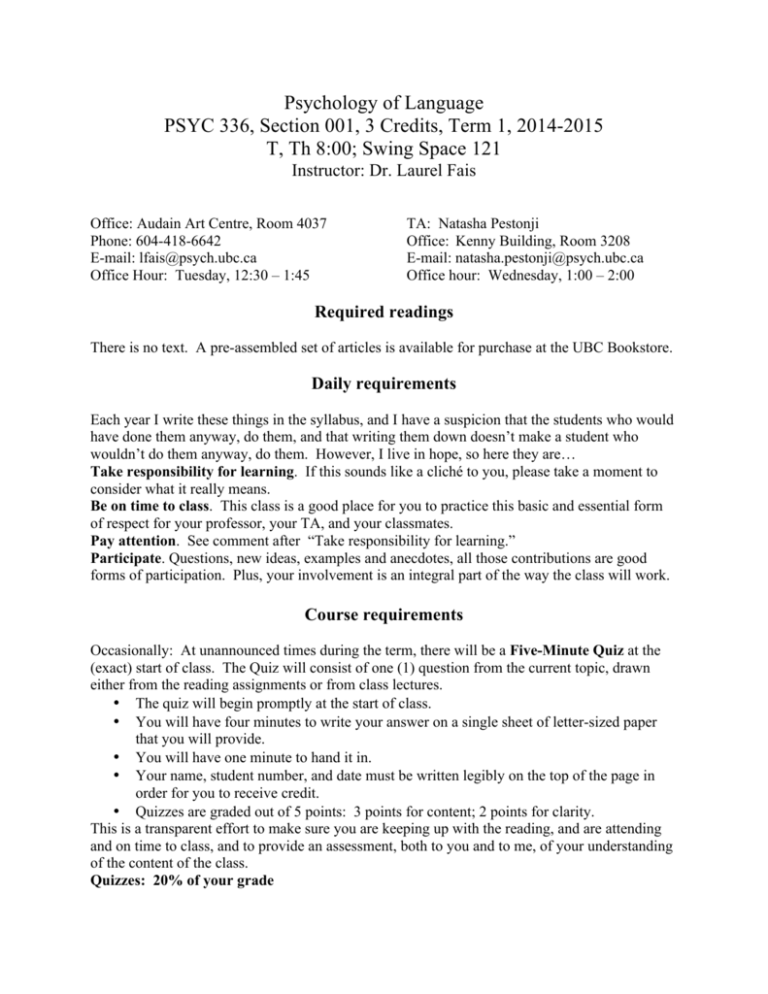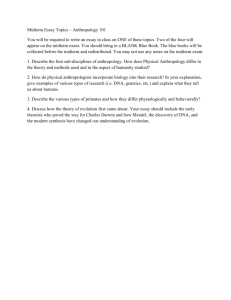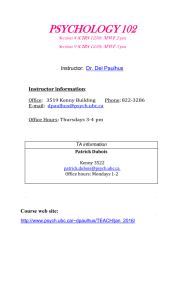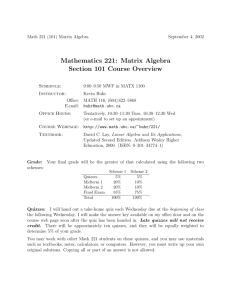Psychology of Language PSYC 336, Section 001
advertisement

Psychology of Language PSYC 336, Section 001, 3 Credits, Term 1, 2014-2015 T, Th 8:00; Swing Space 121 Instructor: Dr. Laurel Fais Office: Audain Art Centre, Room 4037 Phone: 604-418-6642 E-mail: lfais@psych.ubc.ca Office Hour: Tuesday, 12:30 – 1:45 TA: Natasha Pestonji Office: Kenny Building, Room 3208 E-mail: natasha.pestonji@psych.ubc.ca Office hour: Wednesday, 1:00 – 2:00 Required readings There is no text. A pre-assembled set of articles is available for purchase at the UBC Bookstore. Daily requirements Each year I write these things in the syllabus, and I have a suspicion that the students who would have done them anyway, do them, and that writing them down doesn’t make a student who wouldn’t do them anyway, do them. However, I live in hope, so here they are… Take responsibility for learning. If this sounds like a cliché to you, please take a moment to consider what it really means. Be on time to class. This class is a good place for you to practice this basic and essential form of respect for your professor, your TA, and your classmates. Pay attention. See comment after “Take responsibility for learning.” Participate. Questions, new ideas, examples and anecdotes, all those contributions are good forms of participation. Plus, your involvement is an integral part of the way the class will work. Course requirements Occasionally: At unannounced times during the term, there will be a Five-Minute Quiz at the (exact) start of class. The Quiz will consist of one (1) question from the current topic, drawn either from the reading assignments or from class lectures. • The quiz will begin promptly at the start of class. • You will have four minutes to write your answer on a single sheet of letter-sized paper that you will provide. • You will have one minute to hand it in. • Your name, student number, and date must be written legibly on the top of the page in order for you to receive credit. • Quizzes are graded out of 5 points: 3 points for content; 2 points for clarity. This is a transparent effort to make sure you are keeping up with the reading, and are attending and on time to class, and to provide an assessment, both to you and to me, of your understanding of the content of the class. Quizzes: 20% of your grade Language sample: Due Thursday, September 11. You are required to bring in a detailed, written transcription of an actual conversation between at least two people. The conversation should consist of • at least four turns per person (do NOT use real names), • of which at least two turns per person have more than two utterances. IMPORTANT: include notes in extensive detail about the context of the conversation: setting, time, etc. Please take care that the subject matter is appropriate for sharing with the entire class. Bring in two copies of this sample: one to be handed in at the beginning of class, and the other to be shared in group discussion. The original recording can be made in audio recording, or by written transcription. If at all possible, audio recordings are preferred; they will provide better information for your work with this language sample later in the term. You do not need to hand in audio recordings, only your written transcription. Group work and presentations: In the second week of class, you will be assigned to a group. On our first discussion day, September 11, the groups will examine the language samples brought in by each member of the group. They will choose one sample that will be the primary focus of the group in-class discussions for the rest of the term. On discussion days, groups will analyze their language sample from the point of view of the week’s topic. They may also draw examples from the language samples of other members of the group, if appropriate. One person will present the ideas of the group to the rest of the class. In addition, that student will turn in a one-page written summary of the ideas of the group, due the following class day (the grade for this summary is given only to the person who wrote it, not to the group as a whole). The person will change each time until every member of the group has had a chance to present. This writeup is an individual (not a group) assignment. The write-up is an opportunity to practice the skills needed to do the final project paper, and to get feedback on how well you can analyze your language sample. Write-up: 15% of your grade First midterm examination. Multiple choice, short answer, and short essay questions. The exam will be held in class on October 16. 22% of your grade Language sample essay: On the last day of class, November 27, you will have an essay about YOUR OWN language sample due. This is an individual assignment. You may choose any aspect of the course that you have found interesting, and discuss it with respect to your language sample. Your language sample essay will be graded on • Your ability to demonstrate your understanding of the topic(s) you chose; • Your ability to identify areas of your sample that exemplify or challenge that topic; • The depth of your analysis of your language sample; • The logical and organizational clarity of your essay. Further details about the essay will be made available after the first midterm. Essay: 20% of your grade Second midterm examination: Multiple choice, short answer, and short essay questions. The exam will be held in class on November 13th. 23% of your grade Psychology Department’s Policy on Grade Distributions and Scaling In order to reduce grade inflation and maintain equity across multiple course sections, all psychology courses are required to comply with departmental norms regarding grade distributions. According to departmental norms, the mean grade in a 300-level class is 70 for a good class, 68 for an average class, and 66 for a weak class, with a standard deviation of 13. Scaling is likely to be used in order to comply with these norms; grades may be scaled up or down as necessary, by the professor or department. Missed exams: You must inform me in advance if an exam is to be missed (e-mail: lfais@psych.ubc.ca) and produce a medical certificate or documentation of family emergency upon returning to class; otherwise, a grade of 0 will be assigned. Psychology Department’s Position on Academic Misconduct Cheating, plagiarism, and other forms of academic misconduct are very serious concerns of the University, and the Department of Psychology has taken steps to alleviate them. In the first place, the Department has implemented software that can reliably detect cheating on multiplechoice exams by analyzing the patterns of students’ responses. In addition, the Department subscribes to TurnItIn--a service designed to detect and deter plagiarism. All materials (term papers, lab reports, etc.) that students submit for grading will be scanned and compared to over 5 billion pages of content located on the Internet or in TurnItIn’s own proprietary databases. The results of these comparisons are compiled into customized “Originality Reports” containing several, sensitive measures of plagiarism; instructors receive copies of these reports for every student in their class. In all cases of suspected academic misconduct, the parties involved will be pursued to the fullest extent dictated by the guidelines of the University. Strong evidence of cheating or plagiarism may result in a zero credit for the work in question. According to the University Act (section 61), the President of UBC has the right to impose harsher penalties including (but not limited to) a failing grade for the course, suspension from the University, cancellation of scholarships, or a notation added to a student’s transcript. All graded work in this course, unless otherwise specified, is to be original work done independently by individuals. Do use any of the indexes and databases listed under Indexes and Databases, Subject Resources, OneSearch or Metasearch on the Library’s website at http://www.library.ubc.ca. (Not sure which index to use? Click HELP on the library homepage at www.library.ubc.ca or try Subject Resources.) If you have any questions as to whether or not what you are doing is even a borderline case of academic misconduct, please consult your instructor. For details on pertinent University policies and procedures, please see Chapter 5 in the UBC Calendar (http://students.ubc.ca/calendar). Class schedule and assigned readings September 4: Introduction to class September 9, 11: The structure and substance of language Excerpt from D. Bolinger, Chapter 2, Aspects of Language, p. 13-33. Fromkin et al., Chapter 1, An Introduction to Language, 2006, p. 3-19. September 11: Language sample due September 16, 18: One phenomenon in language acquisition Werker, J.F., & Tees, R.C. (1984). Cross-language speech perception: Evidence for perceptual reorganization during the first year of life. Infant Behavior and Development, 7, 49-63. Maye, J., Werker, J.F., & Gerken, L. (2002). Infant sensitivity to distributional information can affect phonetic discrimination. Cognition, 82, B101–B111. September 23, 25: Poverty of the stimulus argument Laurence, S. & Margolis, E. 2001. The poverty of the stimulus argument. British Journal for the Philosophy of Science 52, 217-276; reading: 217-239. Pullum, G.K. & Scholz, B.C. 2002. Empirical assessment of stimulus poverty arguments. Linguistic Review 19, 9-50; reading: 9-23. September 30, October 2: Is language special? Vouloumanos, A. & Werker, J.F. 2007. Listening to language at birth: evidence for a bias for speech in neonates. Developmental Science 10(2), 159-171. Vouloumanos, A., Hauser, M. D., Werker, J. F., & Martin, A. 2010. The tuning of human neonates’ preference for speech, Child Development, 81(2), 517–527. Abstract required reading, rest optional: Shultz, S. & Vouloumanos, A. 2010. Three-montholds prefer speech to other naturally occurring signals. Language Learning and Development, 6, 241–257. October 7, 9: Universal Grammar? Evans, N. & Levinson, S.C. 2009. The myth of language universals: Linguistic diversity and its importance for cognitive science. Behavioral and Brain Sciences 32, 429-492, and commentaries. !!!!!!!! October 14, 16: Discussion, Review and First Midterm October 16: First Midterm October 21, 23: What bilingualism can tell us about language Sabourin, L. & Stowe, L. A. (2008) Neurobiology of language learning. In The Handbook of Educational Linguistics, (Eds. B. Spolsky & F. Hult). Boston, MA: Wiley-Blackwell Publishing. Christoffels, I. K., Firk, C., & Schiller, N. O. 2007. Bilingual language control: An event-related brain potential study. Brain Research, 1147, 192-208. October 28, 30: Bilingualism Ventureyra, V. A. G., Pallier, C., & Yoo, H.-Y. (2004). The loss of first language phonetic perception in adopted Koreans. Journal of Neurolinguistics, 17, 79-91. Pallier, C., Dehaene, S., Poline, J.-B., LeBihan, D., Argenti, A.-M., Dupoux, E., & Mehler, J. (2003). Brain imaging of language plasticity in adopted adults: Can a second language replace the first? Cerebral Cortex, 13, 155-161. November 4, 6: Language in use Martin, A., Onishi, K. H., & Vouloumanos, A. 2012. Understanding the abstract role of speech in communication at 12 months. Cognition 123, 50–60. Garrod, S. & Pickering M. J. (2004). Why is conversation so easy? Trends in Cognitive Sciences, 8(1), 8-11. (week of) November 13: Review and Second Midterm November 13: Second Midterm November 18, 20: Language and world view Whorf, B. L. (1956). “The relation of habitual thought to language,” and “Science and linguistics,” both from Language Thought and Reality, Selected Writings of Benjamin Lee Whorf, John B. Carroll, ed. MIT Press: Cambridge. November 25, 27: Language and world view Boroditsky, L. (2001). Does language shape thought? Mandarin and English speakers’ conceptions of time. Cognitive Psychology, 43, 1-22. November 27: Language sample essay due





